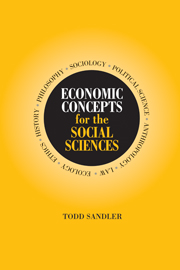Book contents
- Frontmatter
- Contents
- Table and Figures
- Preface
- 1 Economics without Apology
- 2 Back to the Future: Political Economy
- 3 In Another's Shoes: Games, Strategies, and Economics
- 4 It Takes Two or More: Public Economics and Collective Action
- 5 Government for the Politician? Public and Social Choice
- 6 Institutions Matter: The New Institutional Economics
- 7 Knowledge Is Power: Asymmetric Information
- 8 Everything Ties Together: General Equilibrium
- 9 Laboratory Economics: Of Rats and Men
- 10 Before Yesterday and Beyond Tomorrow: Intergenerational Economics
- 11 Fish, Space, and Spaceship Earth: Bioeconomics and Interdisciplinary Economics
- 12 Crystal Ball Economics: Rational Expectations
- 13 How Do We Get There from Here? Transition Economies and Policy Reforms
- 14 Economic Growth: Endogeneity, Institutions, and Other Concepts
- 15 Economic Visions of Future Horizons
- References
- Author Index
- Subject Index
7 - Knowledge Is Power: Asymmetric Information
Published online by Cambridge University Press: 14 May 2010
- Frontmatter
- Contents
- Table and Figures
- Preface
- 1 Economics without Apology
- 2 Back to the Future: Political Economy
- 3 In Another's Shoes: Games, Strategies, and Economics
- 4 It Takes Two or More: Public Economics and Collective Action
- 5 Government for the Politician? Public and Social Choice
- 6 Institutions Matter: The New Institutional Economics
- 7 Knowledge Is Power: Asymmetric Information
- 8 Everything Ties Together: General Equilibrium
- 9 Laboratory Economics: Of Rats and Men
- 10 Before Yesterday and Beyond Tomorrow: Intergenerational Economics
- 11 Fish, Space, and Spaceship Earth: Bioeconomics and Interdisciplinary Economics
- 12 Crystal Ball Economics: Rational Expectations
- 13 How Do We Get There from Here? Transition Economies and Policy Reforms
- 14 Economic Growth: Endogeneity, Institutions, and Other Concepts
- 15 Economic Visions of Future Horizons
- References
- Author Index
- Subject Index
Summary
I once had a friend who owned a house beside a stream. Unlike his neighbors' houses, plagued by mice and rats, his house had been rodent-free during his ten-year occupancy. His neighbors thought him dishonest when he would reply to their incessant complaints about rats that he had never seen a single rodent in his house. On the day before he was to sell his house, he was awakened in the middle of the night by a weird sound coming from the attic. Thinking that he would come face to face with his first rat, he went with a flashlight to inspect the attic. When he opened the trap door and stuck in his head, he let out a scream and dropped the light. The ten-year-old mystery had been solved – a large beady-eyed snake stared at him with a rat in its coils. My friend faced a real dilemma: should he tell the prospective buyer about the snake, or try to rid the house of the reptile, or just be quiet about it? He chose silence, as the other options could either jinx the sale or be very costly. He reasoned that the snake was harmless and served a very useful purpose. So he said nothing, and the house and the snake were sold together. This rather bizarre, but true, story represents an instance of asymmetric information, where one party to a transaction is more informed than the other party.
- Type
- Chapter
- Information
- Economic Concepts for the Social Sciences , pp. 110 - 129Publisher: Cambridge University PressPrint publication year: 2001



